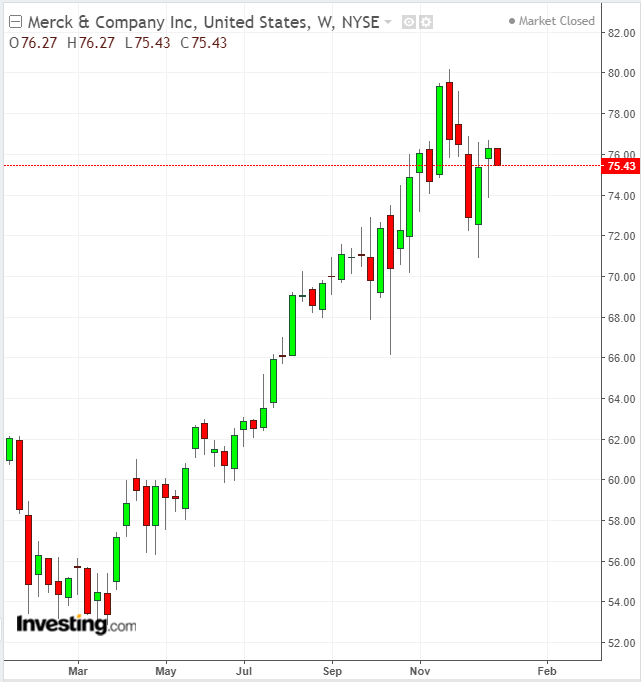As 2019 begins, it looks as if markets are picking up where they left off at the end of last year, when volatility reigned and high-flying growth stocks started losing their luster. We believe volatility will continue and growth stocks will remain under pressure on increasing concerns the decade-long US economic expansion could be coming to an end.
During times of market gyrations and increasing economic uncertainty, having a few income stocks in one's portfolio is a good defense. In fact, in 2018 defensive stocks outperformed the broader market. In this space, we strongly favor the global healthcare provider Merck (NYSE:MRK) for two reasons—its roster of top selling meds and the company's dependable dividend.
1. Strong Growth Momentum; Powerhouse Drugs

Over the past three years, Merck has consistently exceeded analysts expectations on earnings. This impressive winning streak powered its shares higher. Indeed, for 2018 it was the best performer among the 30 mega cap companies listed on the Dow Jones Industrial Average, gaining 30% for the year.
We don’t expect that pace of growth to slow anytime soon either. Merck's cancer immunotherapy drug, Keytruda, continues to capture market share. In the first nine of months of 2018, Keytruda sales doubled, reaching a whopping $5 billion. The drug has become a core component of Merck’s growth, particularly in the large and lucrative area of lung cancer.
Earlier this year the drug showed what medical experts called practice-changing results when combined with chemotherapy. As well, just last month, Keytruda gained EU approval for use on adults who've undergone surgery to remove melanomas. According to Merck, it's the first approval for the drug as an auxiliary treatment in the European Union.
Some analysts expect the majority of previously untreated patients will start taking the drug as well. According to EvaluatePharma projections, it could bring in $12.69 billion in annual sales by 2024. Helped by Keytruda’s remarkable success, Merck plans to invest $16 billion on new capital projects through 2022, a 33% surge over what the company announced it would spend in early 2018.
While Merck’s cancer treatment is grabbing much of the attention, the company’s other drugs are also performing well. HPV vaccine Gardasil’s sales were up 55% in the third-quarter from the year ago period, while diabetes medications Januvia and Janumet brought in $1.49 billion in sales during the same period.
2. Reliable Payouts
One of the primary reasons to bet on a dividend paying stock is for its benefits during market highs and lows. Which means the focus should be on the company's history of reliably paying dividends.
With its forward dividend yield of about 3%, Merck has made returning capital to investors a top priority. Since at least 1970, the company has never missed a quarterly payout. Merck's dividend has grown at an annualized rate of 5.5% since 2010—beating the rate of inflation. After delivering a 15% hike in October, Merck now pays $0.55 a share every three months.
The company has also been returning capital to stockholders in recent years via share buybacks, further boosting its total yield. In October, the company announced that it plans to buy back an additional $10 billion worth of outstanding shares.
Any future dividend growth will depend on both earnings and the company's payout ratio. Merck's current payout ratio is 66%, suggesting it's in a comfortable position to continue the current dividend growth strategy.
Bottom Line
If you’re looking to play it safe in 2019, Merck is worth considering. At its current $75.43 share price, with a dividend yield that's a bit higher than the pharmaceutical industry average, it's a good shelter for conservative, long-term investors.
